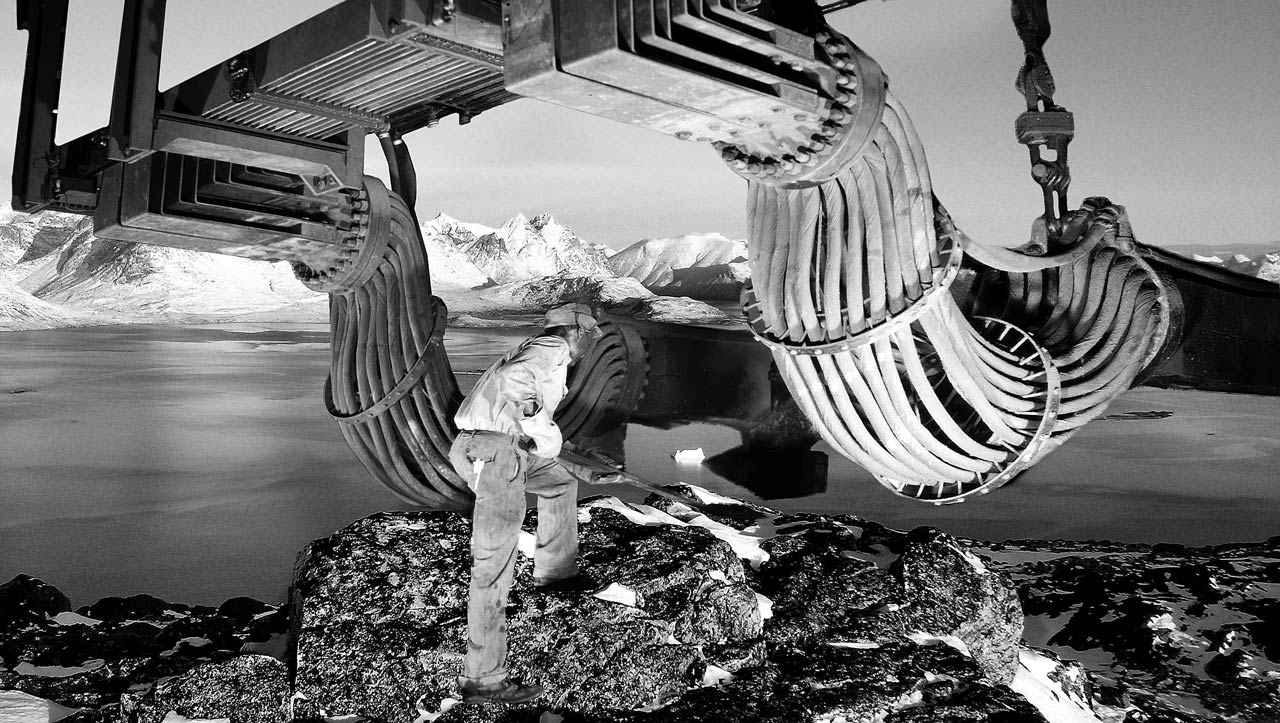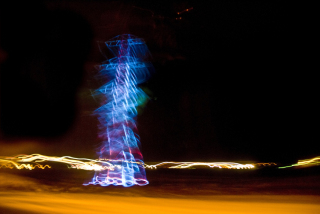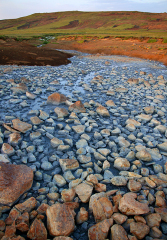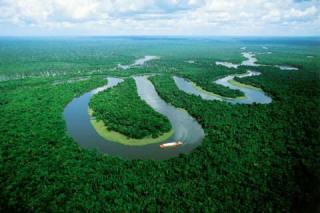Background
Jul 16 2010
4 Comments
ALCOA, Cultural, Greenland, hydropower, Kárahnjúkar, Miriam Rose
Miriam Rose
Climate change has made Greenland the next industrial frontier, but at what cost?

Humanity is in denial. We know that our hyperactive extraction of fuels, metals and minerals, and their dirty processing, consuming and dumping for our consumer ‘growth’ society is killing the planet and ourselves. We also know that all of these sugary treats are finite. But like an insolent toddler we continue; more and more, faster and faster – running in denial from the planetary spanking that is undoubtedly coming our way.
I have often hoped that the global emergency of climate change, combined with the inescapable reality of peak oil would wake us up from this selfish resource-gorging, and perhaps it still will before it is too late (too late: I.e tomorrow? 2012? 2020? a few months ago?). But in the meantime, nature has given western capitalism one last laugh. As the ice drips and cracks from Greenland’s white mass it is exposing a treasure trove of minerals, metals, ores and oil (one of the highest concentrations in the world), and plentiful hydro-power to help us heat, break and alter them into things we ‘need’. Just as the candle wick flares and gutters on our oil-driven consumptive society Greenland’s bounty has given it one more chance. One last bright flame, to hide from us the surrounding darkness.
Read More
Jul 15 2010
Bauxite, India, Miriam Rose, Orissa, Repression, Vedanta
 Orissa is the most mineral rich state in India. It is green and fertile, a patchwork of tiny fields and thickly forested mountains with waterfalls tumbling over their red rocks. Like many of the world’s remaining areas of natural fertility, these mountains are largely populated by tribal peoples, which in India are called Adivasis – meaning literally ‘the original inhabitants’ – and are thought to be one of the oldest civilisations in the world. One quarter of the Orissan population are tribal, making it also the ‘poorest’ state in India according to the World Bank. But its figures judge well-being only by monetary exchange, and fail to mention that there has never been a famine recorded here, and that many Adivasis rarely use money, living in balance with the mountains, streams and forests which provide everything they need. In thanks for natures’ providence many Adivasi cultures worship the mountains on which they depend as Gods, and vow to protect their bountiful natural systems from damage. Some of the Orissan mountains are among the last ancient forest capped hills in India, thanks to the determination of tribal inhabitants against British colonial efforts to log them.
Orissa is the most mineral rich state in India. It is green and fertile, a patchwork of tiny fields and thickly forested mountains with waterfalls tumbling over their red rocks. Like many of the world’s remaining areas of natural fertility, these mountains are largely populated by tribal peoples, which in India are called Adivasis – meaning literally ‘the original inhabitants’ – and are thought to be one of the oldest civilisations in the world. One quarter of the Orissan population are tribal, making it also the ‘poorest’ state in India according to the World Bank. But its figures judge well-being only by monetary exchange, and fail to mention that there has never been a famine recorded here, and that many Adivasis rarely use money, living in balance with the mountains, streams and forests which provide everything they need. In thanks for natures’ providence many Adivasi cultures worship the mountains on which they depend as Gods, and vow to protect their bountiful natural systems from damage. Some of the Orissan mountains are among the last ancient forest capped hills in India, thanks to the determination of tribal inhabitants against British colonial efforts to log them.
Read More
Jul 13 2010
4 Comments
Actions, ALCOA, Alterra Power/Magma Energy, Century Aluminum, Corruption, Democracy deficit, Greenwash, H.S. Orka, Helguvík, Hengill, IMF, Landsvirkjun, Neo-Liberalism, Reykjavik Energy, Rio Tinto Alcan, Saving Iceland
Join our resistance against the industrialization of Europe’s last remaining great wilderness and take direct action against heavy industry!
The Struggle So Far
The campaign to defend Europe’s greatest remaining wilderness continues. For the past five years summer direct action camps in Iceland have targeted aluminium smelters, mega-dams and geothermal power plants.
After the terrible destruction as a result of building Europe’s largest dam at Kárahnjúkar and massive geothermal plants at Hengill, there is still time to crush the ‘master plan’ that would have each major glacial river dammed, every substantial geothermal field exploited and the construction of aluminium smelters, an oil refinery, data farms and silicon factories. This would not only destroy unique landscapes and ecosystems but also lead to a massive increase in Iceland’s greenhouse gas emissions. Read More
Jan 28 2010
Climate Change, Dams, Ecology, Greenwash, hydropower
by Aviva Imhof & Guy R. Lanza
 Big dams have a serious record of social and environmental destruction, and there are many alternatives. So why are they still being built?
Big dams have a serious record of social and environmental destruction, and there are many alternatives. So why are they still being built?
On a hot May day, a peasant farmer named Bounsouk looks out across the vast expanse of water before him, the 450-square-kilometer reservoir behind the new Nam Theun 2 dam in Laos. At the bottom of the reservoir is the land where he once lived, grew rice, grazed buffalo, and collected forest fruits, berries, and medicinal plants and spices. Now there is just water, water everywhere.
Read More
Nov 27 2009
Economic Collapse, Economics, Energy Prices, Heavy Industry, Kárahnjúkar, Landsvirkjun
By Indriði H. Þorláksson – Economist
The economic effects of heavy industry must take into account both short and long term economic policies.
Statements put forth without reasoning sometimes obtain more significance than they merit. Two such statements that are held aloft about the building of energy plants and heavy industry are particularly dangerous.
On the one hand that they are necessary and that they might even be the way out of the crisis and on the other that the future of the Icelandic economic system is best insured by utilizing energy resources and with heavy industry. One looks to the short term and the other to the long term but both are questionable, probably wrong and even dangerous.
The economic impact of heavy industry must take into account both short and long term economic policies, In the short term, say 3-5 years the goal is to restart the economy. In the long term the goal is to promote growth in the economic system to provide citizens with the good things in life. To do so the economy has to provide the highest augmented value to the nation for its work, capital and resources.
Read More
Nov 17 2009
4 Comments
ALCOA, Alterra Power/Magma Energy, Amazon, Arms Industry, Bakki, Century Aluminum, Climate Change, Ecology, Economics, Geothermal Energy, Greenwash, H.S. Orka, Helguvík, Jaap Krater, Landsvirkjun, Mining, Miriam Rose, Reykjavik Energy, Rio Tinto Alcan, Saving Iceland, South Africa
By Jaap Krater and Miriam Rose
In: Abrahamsky, K. (ed.) (2010) Sparking a World-wide Energy Revolution: Social Struggles in the Transition to a Post-Petrol World. AK Press, Edinburgh. p. 319-333
Iceland is developing its hydro and geothermal resources in the context of an energy master plan, mainly to provide power for expansion of the aluminium industry. This paper tests perceptions of geothermal energy as low-carbon, renewable and environmentally benign, using Icelandic geothermal industry as a case study.
The application of geothermal energy for aluminium smelting is discussed as well as environmental and human rights record of the aluminium industry in general. Despite application of renewable energy technologies, emission of greenhouse gases by aluminium production is set to increase.
Our analysis further shows that carbon emissions of geothermal installations can approximate those of gas-powered plants. In intensely exploited reservoirs, life of boreholes is limited and reservoirs need extensive recovery time after exploitation, making geothermal exploitation at these sites not renewable in the short to medium term. Pollution and landscape impacts are extensive when geothermal technology is applied on a large scale.
Krater and Rose – Development of Iceland’s Geothermal Energy – Download as PDF
The full publication will be available from Jan. 15, 2010. ISBN 9781849350051.
Nov 14 2009
18 Comments
Welcome to SavingIceland.org! If you are new to our site you can begin with having a quick look at the About Us section and then read the S.O.S. and the Saving Iceland Mobilisation Call-Out. Iceland Under Threat shows the wilderness we need to protect and the corporations bent on ruining it. Make sure to enjoy our video and photo galleries, our in-depth magazine Voices of the Wilderness and follow our Twitter feed to keep up to date. And last but not least get some answers to Frequently Asked Questions.
Oct 10 2009
1 Comment
Alterra Power/Magma Energy, Economics, Geysir Green Energy, H.S. Orka, Reykjanes, Reykjavik Energy
From The Reykjavík Grapevine, by Catharine Fulton – One by one men in suits of varying shades of grey approached the podium in the pit of the Reykjavík City Hall. One by one they pleaded their cases while Reykjavík’s esteemed mayor—the fourth in two years—Ms. Hanna Birna Kristjánsdóttir looked on appearing disinterested in what appeared to be solely a formality. As the council members continued selling the idea of selling Iceland’s resources, a crowd of 100-strong grew more agitated and increasingly vocal from their perch in the viewing gallery of the hall, separated from having a say in their own natural resources by an aesthetically pleasing glass barrier.
“People were screaming, saying that the politicians were traitors,” explained Jón Bjarki Magnússon, a student who arrived at City Hall just in time for the vote. “It was a weird feeling to see it happen, to see these people down on the floor raise their hands and the decision is made and to see all these angry people above them not able to do anything.”
The September 15th city council meeting stretched on for over three hours, during which time onlookers shouted and boo-ed as city council progressed toward approving the 32.32% sale of Iceland’s HS Orka to the Canadian-cum-Swedish firm Magma Energy Corp. Read More
Sep 20 2009
ALCOA, Amazon, Climate Change, Mining
Alcoa and Cargill have bypassed laws designed to prevent destruction of the world’s largest rain forest, Brazilian prosecutors say. The damage wrought by scores of companies is robbing the earth of its best shield against global warming.
By Michael Smith and Adriana Brasileiro
Bloomberg Markets, September 2009
For four decades, Edimar Bentes and his family have survived by farming tiny clearings in the jungle near their dirt-floor shack in the state of Para in the Brazilian Amazon. On this April afternoon, Bentes, 56, squats in the driving rain and dips a glass into what just four years ago was a crystal-clear stream that provided drinking and bathing water. He frowns as the glass fills with brown silt. A thin man with short-cropped dark hair and a tanned, deeply wrinkled forehead, Bentes gazes around his land. There are no signs of the deer, armadillos and pacas he used to hunt to feed his wife and 10 children. For Bentes and thousands of others in the Juruti region of Para whose livelihood depends on wildlife and plants, everything changed in 2006.
That’s when New York-based Alcoa Inc., the world’s second-largest primary aluminum producer, started to bulldoze a 56-kilometer (35-mile) swath of the rain forest across hundreds of families’ properties to build a railway. This cleared corridor, 100 meters (109 yards) wide, will lead to a mine that will chew up 10,500 hectares (25,900 acres) of virgin jungle over three decades. More than half of the mine will lie inside a forest that by Brazilian federal law is supposed to be preserved unharmed forever for local residents. By year’s end, Alcoa says, the railway will transport 7,000 tons a day of bauxite, the dark red ore that’s used to make aluminum, from the mine to a port on the Amazon River. Read More
Apr 25 2009
Actions, ALCOA, Century Aluminum, Corruption, Democracy deficit, Economic Collapse, Economics, Greenwash, Kárahnjúkar, Landsvirkjun, Media bias, Ólafur Páll Sigurdsson, Rio Tinto Alcan, Saving Iceland
Olafur Pall Sigurdsson
Saving Iceland applauds the symbolic hits that the three pro-heavy industry political parties were dealt in the form of liberal splashes of green skyr (traditional Icelandic dairy product) on Monday.
According to Saving Iceland’s sources, three different groups, not just one, like the corporate media have claimed, did these actions almost simultaneously. Saving Iceland has also been informed that the activists were all Icelandic. It appears that this is a powerful group of activists, fighting the heavy industrialization of Iceland. Saving Iceland declares full support with the group.
The forces that stand behind Sjálfstæðisflokkurinn (Conservatives), Framsóknarflokkurinn (Right-wing opportunists) and Samfylkingin (New Labour equivalents), are guilty of what is tantamount to high treason with their heavy industry policy. Judging from their election propaganda, there is no sign that the parties have been willing to learn anything from the economic collapse about the expansion effects on the economy by heavy industry.
At the same time as these parties’ policy of uncontrollable greed has been pursued with the consequences of immense irreversible destruction of the country’s unique nature, this policy has just as much harmed Icelandic society as a whole. Read More

 Orissa is the most mineral rich state in India. It is green and fertile, a patchwork of tiny fields and thickly forested mountains with waterfalls tumbling over their red rocks. Like many of the world’s remaining areas of natural fertility, these mountains are largely populated by tribal peoples, which in India are called Adivasis – meaning literally ‘the original inhabitants’ – and are thought to be one of the oldest civilisations in the world. One quarter of the Orissan population are tribal, making it also the ‘poorest’ state in India according to the World Bank. But its figures judge well-being only by monetary exchange, and fail to mention that there has never been a famine recorded here, and that many Adivasis rarely use money, living in balance with the mountains, streams and forests which provide everything they need. In thanks for natures’ providence many Adivasi cultures worship the mountains on which they depend as Gods, and vow to protect their bountiful natural systems from damage. Some of the Orissan mountains are among the last ancient forest capped hills in India, thanks to the determination of tribal inhabitants against British colonial efforts to log them.
Orissa is the most mineral rich state in India. It is green and fertile, a patchwork of tiny fields and thickly forested mountains with waterfalls tumbling over their red rocks. Like many of the world’s remaining areas of natural fertility, these mountains are largely populated by tribal peoples, which in India are called Adivasis – meaning literally ‘the original inhabitants’ – and are thought to be one of the oldest civilisations in the world. One quarter of the Orissan population are tribal, making it also the ‘poorest’ state in India according to the World Bank. But its figures judge well-being only by monetary exchange, and fail to mention that there has never been a famine recorded here, and that many Adivasis rarely use money, living in balance with the mountains, streams and forests which provide everything they need. In thanks for natures’ providence many Adivasi cultures worship the mountains on which they depend as Gods, and vow to protect their bountiful natural systems from damage. Some of the Orissan mountains are among the last ancient forest capped hills in India, thanks to the determination of tribal inhabitants against British colonial efforts to log them.
 Big dams have a serious record of social and environmental destruction, and there are many alternatives. So why are they still being built?
Big dams have a serious record of social and environmental destruction, and there are many alternatives. So why are they still being built?


